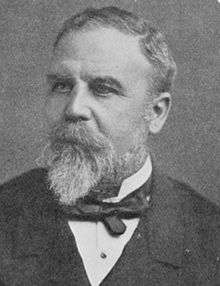Beauchamp Seymour, 1st Baron Alcester
| Admiral The Lord Alcester | |
|---|---|
 Lord Alcester | |
| Nickname(s) | The Ocean Swell |
| Born |
12 April 1821 London, England |
| Died |
30 March 1895 (aged 73) London, England |
| Allegiance | United Kingdom |
| Service/ | Royal Navy |
| Years of service | 1834–1885 |
| Rank | Admiral |
| Commands held |
HMS Brisk (1853) HMS Meteor (1855–56) Naval Brigade, New Zealand (1860–61) Junior Naval Lord (1872–74) Channel Fleet (1874–77) Mediterranean Fleet (1880–83) Second Sea Lord (1883–85)[1] |
| Battles/wars |
Crimean War (1856) Maori War (1860–1861) Anglo-Egyptian War (1882) |
| Awards | Knight Grand Cross of the Order of the Bath |
| Relations | Horace Seymour (father) |
Admiral Frederick Beauchamp Paget Seymour, 1st Baron Alcester, GCB (12 April 1821 – 30 March 1895) was a British naval commander. He was Commander-in-Chief of the Channel Fleet between 1874 and 1877 and of the Mediterranean Fleet between 1880 and 1883.
Background
Seymour was the son of Colonel Sir Horace Seymour and a cousin of the 5th Marquess of Hertford. [2] He was a great-grandson of the 1st Marquess of Hertford.[3]
Naval career
Seymour entered the Royal Navy in 1834, and served in the Mediterranean and the Pacific, and was for three years aide-de-camp to his uncle Sir George Seymour, and was promoted to commander in 1847. He also served in Burma. He was the Commander-in-Chief of the Australia Station from 10 March 1860 and 21 July 1862 as Commodore second class with his pennant aboard Pelorus. He commanded the Naval Brigade in New Zealand during the New Zealand Wars of 1860–61, and was made a Companion of the Order of the Bath (CB) for this.[2]
In 1872, he became a Fourth Naval Lord for two years, and then commander the Channel Fleet. He became a vice-admiral on 31 December 1876, and was appointed KCB in June 1877, and was promoted to GCB on 24 May 1881. From 1880 to 1883 he was Commander-in-Chief, Mediterranean Fleet and from 1883 to 1885 he was Second Naval Lord. He became an admiral in May 1882.[2]
He was created Baron Alcester (pronounced "Allster"), of Alcester in the County of Warwick, on 24 November 1882[4][5] for his command of the bombardment of Alexandria and in the subsequent operations on the coast of Egypt. He was also honoured with a parliamentary grant of £25,000, the Freedom of the City of London and a Sword of Honour.[2]
Personal life
Lord Alcester never married. He died 30 March 1895, aged 73, when his peerage became extinct.[2][5]
In his will he left the balance of his estate to Agnes Sinclair for her lifetime. On her death, two fifths were left to Frederick Charles Horace Sinclair and one fifth each to Hugh Francis Paget Sinclair, Claude Sinclair and Evelyn Sinclair.[6]
See also
- O'Byrne, William Richard (1849). "


References
- ↑ Lundy, Darryl. "The Peerage". Retrieved 2007-10-15.
- 1 2 3 4 5 Chisholm 1911.
- ↑ Cokayne 1910, p. 97.
- ↑ "No. 25170". The London Gazette. 21 November 1882. p. 5195.
- 1 2 Cokayne 1910, p. 98.
- ↑ Berrow's Worcester Journal (Worcester, England), Saturday, 18 May 1895; pg. 2; Issue 10517
- Cokayne, George E. (1910). Gibbs, Vicary, ed. The complete peerage of England, Scotland, Ireland, Great Britain and the United Kingdom, extant, extinct, or dormant. I, Ab-Adam to Basing. London: St. Catherine Press. pp. 97–98.
- Attribution

External links
- American University in Cairo, Rare Books and Special Collections Library (6 July 1882), Alexandria Bombardment of 1882 Photograph Album
| Wikimedia Commons has media related to Beauchamp Seymour, 1st Baron Alcester. |
| Military offices | ||
|---|---|---|
| Preceded by William Loring |
Commander-in-Chief, Australia Station 1860–1862 |
Succeeded by William Burnett |
| Preceded by Sir John Tarleton |
Junior Naval Lord 1872–1874 |
Succeeded by Lord Gillford |
| Preceded by Sir Geoffrey Hornby |
Senior Officer in Command of the Channel Squadron 1874–1877 |
Succeeded by Lord John Hay |
| Preceded by Sir Geoffrey Hornby |
Commander-in-Chief, Mediterranean Fleet 1880–1883 |
Succeeded by Lord John Hay |
| Preceded by Lord John Hay |
Second Naval Lord 1883–1885 |
Succeeded by Sir Anthony Hoskins |
| Peerage of the United Kingdom | ||
| Preceded by New Creation |
Baron Alcester 1882–1895 |
Succeeded by Extinct |